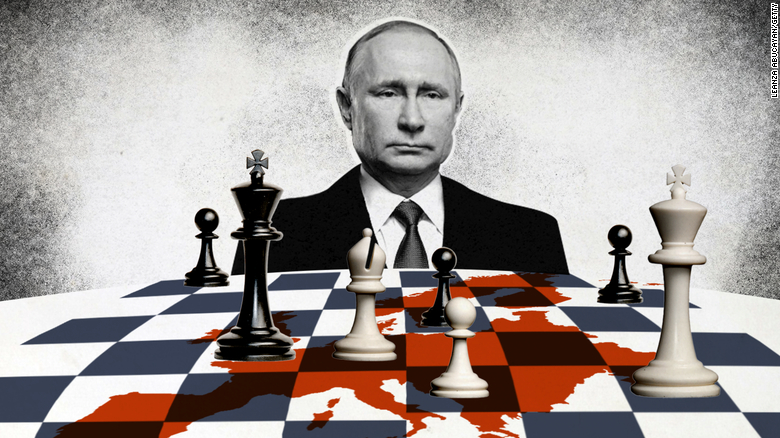Michael Bociurkiw

(CNN)As 2022 nears, the West is trying to figure out Russian President Vladimir Putin's next move on a complex geopolitical chessboard -- and preparing an "aggressive package" of sanctions, should he decide to make another land grab in Ukraine.
Tensions are now at their highest since 2014, when Russia illegally annexed Crimea and dispatched "little green men" into Ukraine's Donbas region. An all-out land invasion of Ukraine is now a real possibility.
But let's face it. Putin could care less about the West's threats, sitting as he does in the enviable position of being able to call the shots.
Europe is in the grip of an energy crisis with low reserves. And with Russia supplying some 40% of the European Union's gas imports, the Kremlin has already shown its ability to checkmate the West's harshest sanctions by limiting production and potentially triggering rolling blackouts across the continent.
Putin's endgame is USSR 2.0, coming almost 30 years to the day the Soviet Union collapsed. His next moves come at a delicate geopolitical moment, with Western fears of a Ukraine invasion, the colonization of Belarus, a Europe-wide energy crisis, German Chancellor Angela Merkel stepping down as EU chief negotiator and concerns over US President Joe Biden's discombobulated foreign policy.
If you've any doubt about Putin's plans to roll back the clock, just read his 5,000-plus-word essay on why Russia, Belarus and Ukraine are doomed without closer integration with Mother Russia. Or his audacious demands Friday for a veto on who joins the NATO alliance and limits in stationing troops and weaponry in any country which joined the alliance after 1997.
Without firing a shot, Putin has managed to send the West into a collective panic -- or at least into a position where they feel the need to appease the aging autocrat.
For the past four months, and particularly between September 7 and December 5 according to western intelligence sources quoted by CNN, Putin has been amassing tens of thousands of troops and heavy weaponry as close as 30 miles to Ukraine's borders. U.S. intelligence reports suggest a build-up of up to 175,000 troops, enough to stage a swift and immediate incursion.
Another land grab would add to the territory seized in 2014 when Russia illegally annexed Crimea and sent Russian-backed combatants into the heavily industrialized eastern Donbas region of Ukraine.
With so much muscle, Putin could be gunning for a land bridge between Russia proper and Crimea -- a move which could be designed in part to free-up water resources blocked by Ukraine in the North Crimean Canal, which once accounted for up to 85% of the peninsula's water needs.
The Kremlin's actions have not been limited to Ukraine. Russia has been engaged in hybrid warfare with the West, including cyberhacking one of the US's largest pipelines, spreading disinformation about coronavirus vaccines, interfering in US elections, and neutralizing opponents on foreign soil.
Most recently, Putin opened up another front with the West by establishing a military alliance with the man often dubbed "Europe's last dictator," Belarus President Alexander Lukashenko. Emboldened by the Kremlin's backing, Lukashenko has acted with impunity by jailing opponents, forcing down a Ryanair jet with a political opponent onboard and sending migrants toward its border with EU neighbors.
Yet, as recently as Thursday, European leaders were responding to Putin's bullying tactics and intimidation by trying to nudge him toward the bargaining table. This could be a sign that the bloc fears that even if they sign off on further harsh sanctions on Russia should an invasion take place, Putin could respond by holding back gas production.
Andrei Soldatov, a Russian investigative journalist and security services expert, told me that the country is already heavily sanctioned, and that targeted Russian companies have been effectively inoculated with lucrative contracts from the defense forces and intelligence entities.
Russia has likely seen the impact of the 2018 harsh western sanctions on Iran and calculated it can withstand punitive measures even if it means suspension from the international SWIFT payment system.
Perhaps not coincidentally, Russia and China pledged this week to work jointly toward a closed trading network that would reduce dependence on the international financial system and limit transactions in US currency.
At home, Putin has been brandishing the state's power through fear and cohesion -- chiefly by banning civil society groups, jailing high profile opponents and threatening Russian nationals who work for foreign embassies.
What are the tools left in the West's diplomatic toolbox? Depressingly few. But some options remain: banning Russians from travel, blocking those multimillion dollar property deals which have transformed London and Miami into playgrounds for wealthy Russians -- even ordering the immediate expulsion of Russian nationals from Western countries. In other words, whatever it takes short of direct military conflict.
Clearly, video chats with Biden and threats from European leaders of "serious consequences" will not deter Putin. With an invasion of Ukraine imminent, the West needs to clarify the pain that awaits Putin should he decide to make his next move.
The appearance of a lack of resolve, whether in diplomacy, on the battlefield or on the chessboard, is never a winning strategy.
No comments:
Post a Comment